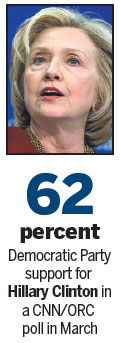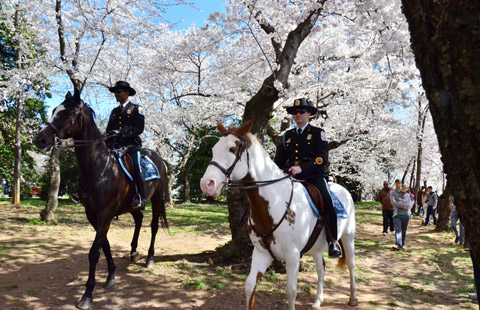Clinton hard line expected on China
Updated: 2015-04-14 08:02
By Zhao Shengnan(China Daily)
|
||||||||
As former US secretary of state Hillary Clinton embarks on her second presidential bid, observers believe she will adopt a hard-line stance toward China, at least during the campaign.
If she wins the nomination and captures the White House, this stance will change as she takes a more pragmatic approach to dealing with the high-stakes relationship, they added.
A Foreign Ministry spokesman in Beijing did not comment directly on Clinton's bid on Monday, saying it is "an internal affair of the US", but that China is ready to work with the US to push forward the relationship.
Healthy and stable growth in Sino-US relations is in the common interest of both countries and conducive to not only maintaining stability and prosperity in the Asia-Pacific region but also the world, Hong Lei said at a daily media briefing.
Clinton, a former US first lady and senator, has been in the political spotlight for a quarter of a century. In various roles, she has dealt with China-related issues since the 1990s. A frequent visitor to China, she has often stressed the benefits of a partnership with Beijing and the importance of strengthening communication and cooperation between both countries.

As a flag-bearer for Washington's "pivot to Asia" policy during her four-year tenure as the US top diplomat from 2009, she made controversial remarks on territorial issues between China and US allies in Asia, drawing strong reactions from Beijing.
Fan Jishe, a US studies researcher at the Chinese Academy of Social Sciences, said Clinton is likely to criticize China during her campaign as she did in 2008, especially as China's strength and influence is now far greater.
China overtook Japan as the world's second-largest economy in 2010 and replaced the US as the world's largest trading nation in 2013.
US President Barack Obama was crtiticized for his foreign policy, and Clinton may distance herself from him by focusing more on Asian affairs and being hawkish about China, Fan said.
Obama's "pivot to Asia" policy, including an increased military presence in Asia and strengthening ties with countries that have territorial disputes with China, has been viewed as an attempt to contain China's rise.
In 2012, Clinton said Southeast Asian countries must present a united front to China in dealing with South China Sea disputes, a suggestion running counter to China's stance on one-on-one talks.
The following year, she said that although the US does not take a position on the ultimate sovereignty of the Diaoyu Islands, it opposes "any unilateral actions" that would seek to undermine Japan's "administration".
Ni Feng, another researcher at the academy, said Clinton fully acknowledges the complexity of the Sino-US relationship, and no matter how the two countries compete with each other, she shares consensus with Beijing of avoiding conflicts.
Opinion polls show Clinton has a huge lead over potential Democratic rivals for the party's 2016 nomination.
zhaoshengnan@chinadaily.com.cn

 Ex-student sought in shooting death of North Carolina college
Ex-student sought in shooting death of North Carolina college
 Women in politics - Hillary Clinton is just one of them
Women in politics - Hillary Clinton is just one of them
 10 Red Dot Award winning carmakers in '14
10 Red Dot Award winning carmakers in '14
 Get a birthday cake for your pets
Get a birthday cake for your pets
 7 ways to beat 'spring sleepiness'
7 ways to beat 'spring sleepiness'
 Legendary painting of Mona Lisa recreated
Legendary painting of Mona Lisa recreated
 National festival underway with cherry blossoms in peak bloom
National festival underway with cherry blossoms in peak bloom
 Ten photos you don't wanna miss - April 13
Ten photos you don't wanna miss - April 13
Most Viewed
Editor's Picks

|

|

|

|

|

|
Today's Top News
US to help smart cities
Clinton's win not guaranteed despite global celebrity
US has record number of applications for H-1B tech visas
Chinese economy to slow more: World Bank report
China's slow down has upside
US voluntary medical team funded for China trip
Hilary Clinton launches
presidential campaign
'No room' for election China-bashing: US politicians
US Weekly

|

|







